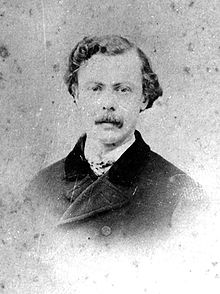Henry Hotze
Henry Hotze (born September 2, 1833 in Zurich , † April 19, 1887 in Zug ) was an agent of the Confederate States of America who worked in London during the American Civil War . The vehement supporter of slavery is considered one of the most influential propagandists for the Confederates in Europe .
origin
His parents were the captain in the French service Rudolf Hotze (1802–1849) and Sophie Esslinger (1810–1891) from Zurich .
Life
Born in Switzerland in 1833 , Hotze emigrated to the USA in 1850 , settled in Mobile , Alabama and became a US citizen in 1856. Commissioned by Josiah C. Nott , he translated the racial essay Essai sur l'inégalité des Races Humaines , written by Arthur de Gobineau , under the title Moral and Intellectual Diversity of Races in 1856 , making it a propaganda tool for the beneficiaries and advocates of slavery available.
During the Civil War , Henry Hotze stayed in London and worked there as an agent and propagandist paid for by the Confederate States of America. His job was to make the Confederate cause appear in a good light in the European public. For example, he published several letters in the London Morning Post under the pseudonym "Moderator" in which he outlined the need for independence and recognition of the Confederate States of America by European governments. He also founded The Index newspaper , a Confederate and slavery-friendly publication that was read by many southern sympathizers within the British government and Europe. He also bribed journalists and printed a variety of propaganda books and pamphlets.
His publications also supported the Anthropological Society in London, which was founded a few weeks after Lincoln's declaration of emancipation in 1863, whose members predominantly rejected a common ancestry of all people , especially a common ancestry of blacks and whites. Hotze's publications praised the Anthropological Society for advocating against equality for all , as the Creator marked different groups of people for different services. They attacked anti-slavery groups , but also, for example, Charles Darwin for his theory, which implied a common ancestry of all people, since it is absurd to speak of whites and blacks as if they were of the same origin (“as if they belong to one stock ... Both M. de Gobineau and Mr. Hotze were wise enough to avoid the rock on which Mr. Darwin made shipwreck. " The Distincions of Race , Index, 23, 1862).
After the Civil War, Henry Hotze did not return to the USA. After moving several times between London and Paris , he died in Zug, Switzerland, in 1887.
Individual evidence
- ↑ Not only Darwin's assertion of a common descent of all humans stood in opposition to Hotze's propaganda. Darwin's family had a long history of speaking out against slavery. Charles Darwin himself supported the Northern States' war against slavery and feared the British government would support the Southern States because of Britain's dependence on cotton supplies. See e.g. B. Adrian Desmond, James Moore: Darwin's Sacred Cause. How a hatred of slavery shaped Darwin's views on human evolution. Houghton Mifflin Harcourt, Boston MA et al. 2009, ISBN 978-0-547-05526-8 .
literature
- Lonnie A. Burnett: Henry Hotze, Confederate propagandist. Selected writings on revolution, recognition, and race. University Alabama Press, Tuscaloosa AL 2008, ISBN 978-0-8173-1620-4 .
- Charles P. Cullop, Confederate propaganda in Europe, 1861-1865 , University of Miami Press, 1969
| personal data | |
|---|---|
| SURNAME | Hotze, Henry |
| BRIEF DESCRIPTION | Swiss-American agent and advocate of slavery |
| DATE OF BIRTH | September 2, 1833 |
| PLACE OF BIRTH | Zurich |
| DATE OF DEATH | April 19, 1887 |
| Place of death | train |
